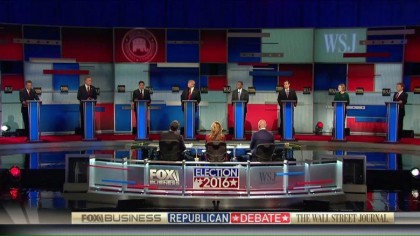
Presidential candidates on science and tech
- Update: This article has been updated to include the poll numbers from the Iowa caucus as well as the current roster of candidates.
There is no greater privilege as an American than that of casting a ballot. The right to vote and thereby influence the political structure of this country cannot be understated in its importance.
But, in a political landscape rife with mouthpieces, skewed advertisements and limitless bankrolls, it can be tough to sort out exactly what to believe and, consequently, what any of the people running for the presidency believe, either.
While the staff here at techradar aren't the foremost experts in politics, I do consider this website to be a top-class tech outlet (techradar is the home of technology, after all).
To that end, instead of sorting out every candidate's shortcomings and strengths, let's focus on the two key areas that are paramount to us techradar readers and editors: science and technology.
Using the website On The Issues, a non-partisan repository for the candidates' statements as well as the candidates' own websites, I've collected and summarized the views, remarks and beliefs of the people who might become the most powerful man or woman in the world in 2017.
It's worth noting here that I've only chosen the top candidates in each of the two primary parties. There are more candidates in the running than made this list, including those running independently, but this list should apply to about 95% of voters out there.
Finally, to address concerns head-on: I'm aware this list looks slightly biased towards the Democratic party. This is based simply on the criteria that science and technology lend themselves to a more progressive agenda rather than a conservative one, and is not intended to garner support for one party over the other.
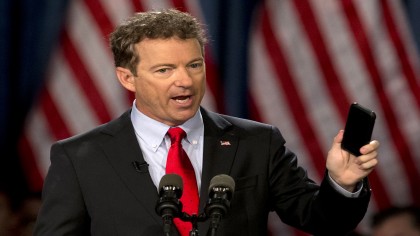
Rand Paul (Republican, out)
Update: Rand Paul announced on Wednesday, Feb. 3 that he would officially end his campaign for President of the United States.
Rand Paul, the 53-year-old Senator from Kentucky, is good at two things: Using the internet to berate opponents during their debates and using his political power to fight against a government-controlled web. We approve of both those things.
For: Wants energy companies, like PG&E, to test aging infrastructure to prevent accidents, like the 2010 explosion in San Bruno, CA that killed 10 people (2012)
For: Fought against the current rule that all the NSA needs is one generalized warrant for information to make cellphone companies hand over all their customers' data (Jan. 2014)
For: Led the charge against SOPA and PIPA (Jan. 2012)
For: "I will not sit idly by while PIPA and SOPA eliminate the constitutionally protected rights to due process and free speech. For these reasons, I have pledged to oppose, filibuster and do everything in my power to stop government censorship of the Internet." (Jan. 2012)
Against: Wants to repeal the Clean Power Act (Nov. 2015)
Against: "What we really need is somebody that understands that we do need energy of all forms, and that means we will have solar, and wind, and hydro, but we will still have coal, and we still will have natural gas. We want to free up the energy sector, and let people produce, let them drill, let them explore." (Nov. 2015)
Against: Opposed Net Neutrality (Nov. 2014)
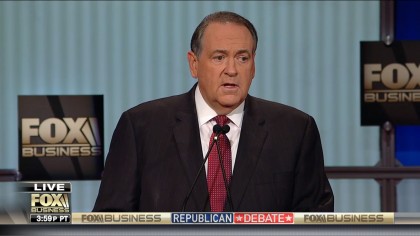
Mike Huckabee (Republican, out)
Update: Mike Huckabee announced on Wednesday, Feb. 3 that he would officially end his campaign for President of the United States.
Huckabee is a "families first" kind of politician. He argues that Americans, in general, need less TV time and more family time. He's also argued that science can never take us to the places religion can but, for all his talk in the late '90s about technology and media corrupting the youth, he's spent the last decade fighting for ubiquitous broadband internet and an increased R&D budget.
For: Proposed financial transparency through the internet in 2008 (Feb. 2008)
For: "I would propose that every time the federal government makes any expenditure, it posts it on the Internet within 24 hours, so you can find out exactly where every dollar of the budget goes, down to how much it costs to mow the courthouse lawn in your hometown." (Feb. 2008)
For: Would modernize the technology behind air traffic controls to reduce the amount of accidents during flights (Oct. 2007)
For: Co-sponsored a bill that radically increased from 0.6% of the country's GDP to 1.5% (Sep. 2001)
For: Urged Congress to speed the deployment of broadband, high speed Internet networking throughout the nation (Sep. 2001)
Against: Believed that violent movies, television and video games contributed to violent crimes (1998)
Against: Has said that science will play second string to religion, and that science is not the way to build a better society (June 1998)
Against: "The utopian vision of society that has so dramatically undermined the family was spawned by a system of thought rooted in the superiority – even the supremacy – of science over every other discipline." (June 1998)
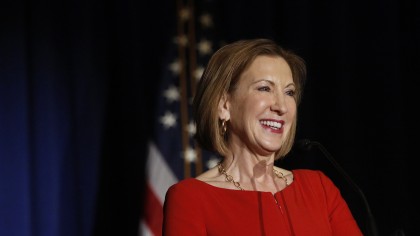
Carly Fiorina (Republican, out)
Update: Carly Fiorina announced on Wednesday, Feb. 10 that she would officially suspend her campaign for President of the United States.
Hailing from Silicon Valley, Fiorina is touted as one of the most successful women in technology. Coming from more of a business background than a political one has allowed Fiorina to avoid getting bogged down by either party's dogma, taking ideas from both sides of the aisle. That said, you might want to do some research on her history as CEO at HP before you cast your vote in the primary.
For: Believes accountability and quantitative metrics are the keys to improving education (May 2015)
For: "The most important thing is to have a world-class 21st century education system. We need to start by insisting on really strong accountability measures in public schools." (May 2015)
For: Unsure about the cause of global warming, but believes solving it is a global issue (Sep. 2010)
For: If elected, would post budgets online for transparency and public comment (Dec. 2009)
Against: Would overturn Net Neutrality (May 2015)
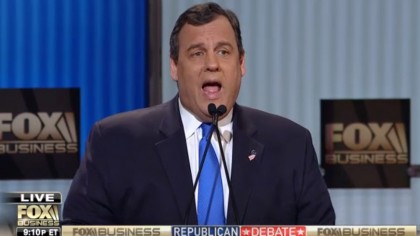
Chris Christie (Republican, out)
Update: Chris Christie announced on Wednesday, Feb. 10 that he would officially suspend his campaign for President of the United States.
Christie, the current governor of New Jersey, hasn't said all that much on the subjects of science and technology, and generally steers the conversation away to larger, more pressing issues when the topics are brought up. Two points he has made abundantly clear, though, are that he would like to drive America towards energy independence by means of nuclear power and that the educational system needs a major overhaul.
For: Doesn't believe education should be free, however would like to see the cost of college go down (June 2015)
For: Helped his home state of New Jersey reach its 2020 clean energy goals five years ahead of schedule (Sep. 2015)
Against: However, Christie doesn't see global warming as a crisis that needs to be addressed (Dec. 2015)
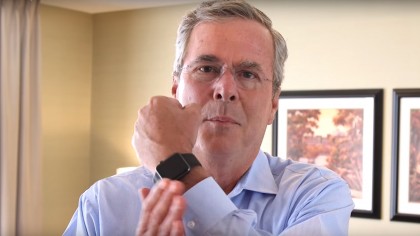
Jeb Bush (Republican, out)
Update: Jeb Bush announced on Saturday, Feb. 20 that he would officially suspend his campaign for President of the United States.
Old George's brother might not be the best spokesperson for the technology-loving community (he uses Apple products almost exclusively), but he does have some ideas on how to balance innovation here in the US with manufacturing done overseas. He's fairly level-headed when it comes to threats against cyber security, however has gone on record saying that, if elected, he would fight against Net Neutrality.
For: A well-rounded plan to meet cyber security threats head-on (Sep. 2015)
For: Believes that technology innovations are shaping the country (Sep. 2015)
For: Says immigrants are key to technology revolution (March 2013)
For: As Governor of Florida, set aside $100 million for a technology development initiative (2002)
For: Believes the climate is changing, and humans play a role in that (July 2015)
For: Would give NASA a $500 million increase in budget (July 2015)
Against: In order to improve cyber security, believes more monitoring is necessary (Sep. 2015)
Against: Would ask tech companies to hand over encrypted data (Jan. 2016)
Against: Would repeal Net Neutrality (Sep. 2015)
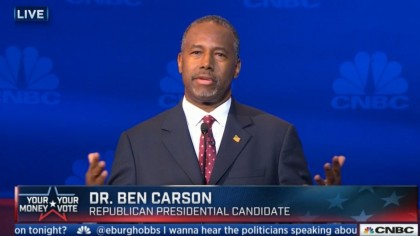
Dr. Ben Carson (Republican, out)
Update: Dr. Ben Carson announced on Friday, March 4 that he would officially end his campaign for President of the United States.
Despite his education in neurosurgery, Dr. Ben Carson has not had the most … well-developed ideas regarding science and technology. While some candidates have allowed religion and science to coexist peacefully, Carson generally has a "one or the other" approach. For example, he called the widely-accepted theory of the Big Bang "a fairy tale" and that evolution was work of the devil.
For: Encourages VR developers to create virtual classrooms (Sep. 2015)
Against: Believes evolution is the work of the devil (Sep. 2015)
Against: "I personally believe that this theory that Darwin came up with was something that was encouraged by the adversary." (Sep. 2015)
Against: Does not accept that humans are the cause of accelerated global warming (Sep. 2015)
Against: Believes the Big Bang theory of the universe is "a fairy tale" (2012)
Against: Supports homeschooling over public or private education (Feb. 2015)
Against: "The best education is the education that is closest to home, and I've found that for instance homeschoolers do the best, private schoolers next best, charter schoolers next best, and public schoolers worst." (Feb. 2015)
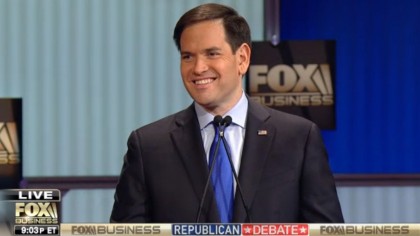
Marco Rubio (Republican, 152 delegates)
Marco Rubio is a young, energetic junior senator of Florida who might have made a better president seven years ago than he would today. He has some big strikes against him when it comes to technology, including co-sponsoring the Protect IP Act that would give copyright holders the power to close down "rogue" websites at their sole discretion.
For: Encouraged stricter guidelines for minors using social media sites MySpace and Facebook (2008)
For: Supports the Internet Tax Freedom Act (ITFA) that prohibits ISPs to add sales tax to monthly internet bills (2015)
For: Supported clean energy in 2008, said Florida should be "an international model of energy efficiency and independence" and the "Silicon Valley" of clean energy (2008)
Against: However, in 2013 said that the US should focus its efforts on extracting coal, oil and natural gas, "instead of wasting more money on so-called clean-energy companies like Solyndra" (2013)
Against: Is against Net Neutrality; the Internet is not a public utility (Feb. 2015)
Against: Co-sponsored PIPA, a bill that sought to fight file-sharing (June 2012)
Against: Would repeal carbon emission mandates set in place by UNFCC (2015)
Against: Encourages information sharing between government and private sector (2015)
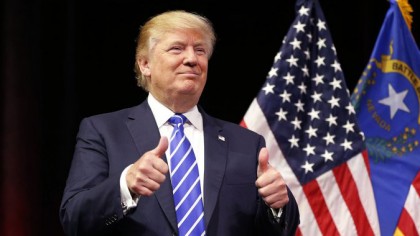
Donald Trump (Republican, 459 delegates)
There's a growing divide in America. There are those that laugh along with Donald Trump and agree with him, and there are those that laugh at him while rooting for one of the less extreme Republicans to clinch the nomination.
Surprisingly, however, his statements in the fields of science and technology aren't all that divisive. He agrees that some part of climate change is real and that the educational system isn't at maximum capacity, and wants a fair mix of open internet and regulation.
For: Agrees that some part of climate change is manmade (June 2015)
For: Believes that the government needs a certain level of visibility into people's lives, but that it cannot violate their personal rights (Oct. 2015)
Against: Concerning climate change, he originally said on Twitter, "The concept of global warming was created by and for the Chinese in order to make US manufacturing non-competitive." (Nov. 2012)
Against: Would cut funding to the Department of Education's Common Core initiative, and overall from the department itself (Jan. 2015)
Against: Has called to shut down sections of the internet (Dec. 2015)
Against: Has called to move Apple manufacturing to America, which would destabilize the company and exponentially raise the cost of its products (Jan. 2016)
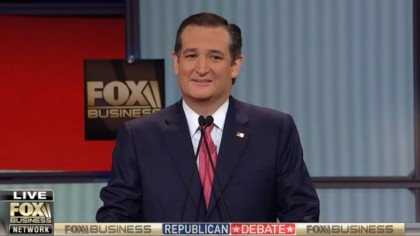
Ted Cruz (Republican, 360 delegates)
Look, I'm not here to judge. If you like Ted Cruz for his stalwart defense of the traditional American values and love affair with the flat tax, it's all good. That said, as far as science and technology are concerned, Cruz has no clue what's going on.
At one point, he confusingly called Net Neutrality "the biggest threat to the internet ever," only to later thank the opponents of PIPA and SOPA for stepping up to the plate to fight for freedom on the web.
For: Wants to spend less time monitoring law-abiding citizens, and more time "going after bad guys" (Jan. 2014)
For: Opposed the Protect IP and Stop Online Piracy Acts (2012)
Against: Opposes Net Neutrality and the idea of reclassifying the internet under Title II of the Communications Act of 1934. (Nov. 2014)
Against: Called Net Neutrality "the ObamaCare for the internet" in a piece for The Washington Post (Nov. 2014)
Against: Denies the impact of human activity on climate change, and claims NASA has done too much research on the subject (March 2015)
Against: Would deport international students upon completion of their bachelors or masters degrees (Dec. 2015)
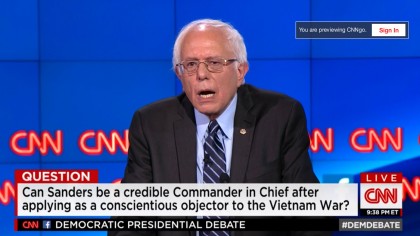
Bernie Sanders (Democrat, 574 delegates)
While Bernie Sanders hasn't given America his complete view on all aspects of science and technology, his broad-stroke ideas are generally agreeable. He generally votes to increase spending for research and development while simultaneously pushing for free college tuition for the first two years. He's a member of the Congressional Internet Caucus and has done the most out of any candidate to preserve the internet in its current form.
For: Calls climate change the biggest threat to national security (Oct. 2015)
For: In 2007, introduced the Internet Freedom Preservation Act, which would have required broadband service providers to adhere to neutrality provisions and other regulations (2007)
For: Is a member of the Congressional Internet Caucus, a group of Senators that educates and informs their colleagues about the challenges and promises of the internet (1996)
For: Believes electing not to vaccinate a child is "dangerous and wrong" (Feb. 2015)
For: Not against GMOs, however believes that foods with GMO crops should be labeled (June 2015)
For: Supports NASA and its quest for discovering new knowledge and technologies (2015)
Against: However, has not said that he would increase the department's budget (2015)
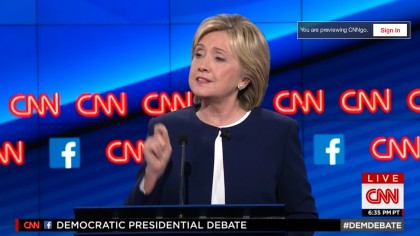
Hillary Clinton (Democrat, 1,223 delegates)
Hillary Clinton has been in politics for a very long time and, as you might expect, carries a bit of baggage into her bid for presidency. While a few issues, like her complacency on the Keystone XL pipeline and email controversy, may have marred her image, Clinton supports many programs that continually push for scientific and technological advances.
For: Proposed the idea of universal pre-kindergarten that will start education one year earlier (June 2007)
For: Was crucial in the negotiations with China for first agreement to lower carbon emissions (2009)
For: Said she prevented the government from "going too far" in its access to private information (Aug. 2014)
For: On SOPA/PIPA: "When ideas are blocked, information deleted, conversations stifled, and people constrained in their choices, the internet is diminished for all of us. There isn't an economic internet and a social internet and a political internet. There's just the internet." (Jan. 2012)
For: "The science of climate change is unforgiving, no matter what the deniers may say. Sea levels are rising; ice caps are melting; storms, droughts and wildfires are wreaking havoc. … If we act decisively now, we can still head off the most catastrophic consequences." (Dec. 2014)
For: "The science is clear: The earth is round, the sky is blue and #vaccineswork. Let's protect all our kids." (Feb. 2015)
Against: Used a private email server for official communications while serving as the Secretary of State (March 2015)
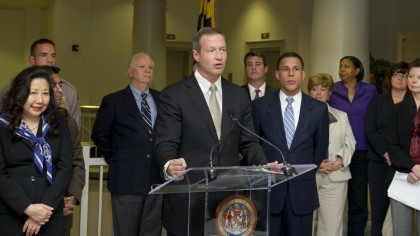
Martin O'Malley (Democrat, out)
Update: Martin O'Malley announced on Wednesday, Feb. 3 that he would officially end his campaign for President of the United States.
Finally, Martin O'Malley, former Governor of Maryland, brings up the rear of the list. Due to O'Malley's low polling numbers, he hasn't seen as much screen time or as much attention from the media as his rivals.
However, he remains one of the possible candidates for the Democratic nomination. In the past, O'Malley has supported funding for building out infrastructure needed for faster internet speeds, and he believes in clean energy. But, without much of a platform, it isn't all that clear how he plans to achieve any of it.
For: "Climate change is real. We must create an American jobs agenda to build a new renewable energy future. … And if we take these actions, the American Dream will live again." (May 2015)
For: Supported an investment of $156 million in federal, state and local funds to connect all 24 counties in Maryland via high-speed fiber-optic broadband (Feb. 2012)
For: Created a position for a Chief Information Officer in Baltimore that would work to drive the "digitization of the federal government" (2000)
For: Has goals for the country to be energy independent and says, "New technologies have put a clean energy, energy independent future within reach…" (June 2015)
Against: However, has not proposed a specific plan or set of technologies to make that possible (June 2015)

Nick Pino is Managing Editor, TV and AV for TechRadar's sister site, Tom's Guide. Previously, he was the Senior Editor of Home Entertainment at TechRadar, covering TVs, headphones, speakers, video games, VR and streaming devices. He's also written for GamesRadar+, Official Xbox Magazine, PC Gamer and other outlets over the last decade, and he has a degree in computer science he's not using if anyone wants it.